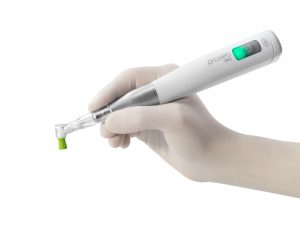The challenges of an aging population – Kate Scheer W&H UK
Featured Products Promotional FeaturesPosted by: Dental Design 11th January 2020

 As people live longer and are healthier, they are more likely to take their natural dentition with them into old age. Indeed, figures from the Adult Dental Health Survey show that although 22% of people aged 65 years and over retained some of their natural dentition in 1978, this had increased by 2009 to 85% of 65- to 74-year-olds, and 67% of those aged 75 years and over.[i]This is undoubtedly good news, but one consequence is that dentists and the allied professions will see an increasing number of older patients in the near future – many of whom may suffer from complex oral health issues.
As people live longer and are healthier, they are more likely to take their natural dentition with them into old age. Indeed, figures from the Adult Dental Health Survey show that although 22% of people aged 65 years and over retained some of their natural dentition in 1978, this had increased by 2009 to 85% of 65- to 74-year-olds, and 67% of those aged 75 years and over.[i]This is undoubtedly good news, but one consequence is that dentists and the allied professions will see an increasing number of older patients in the near future – many of whom may suffer from complex oral health issues.
Whereas dental care for older individuals used to primarily involve providing dentures to those who had lost all their teeth, many elderly people now require regular, ongoing maintenance of heavily restored dentition. Additional challenges can present in those who struggle to practise good oral hygiene in old age and are more susceptible to oral disease as a result. For instance, brushing twice a day and cleaning interdentally may not be easy for older patients with limited dexterity or a long-term illness. Maintaining effective oral hygiene can also be difficult for elderly people with mental health issues such as Alzheimer’s disease, which can make them particularly resistant to care.
Furthermore, older patients are more likely to be taking one or several prescribed medications – anti-psychotics, anti-epileptics, anti-depressants, beta-blockers, and diuretics, for example. These can have a wide range of side effects such as xerostomia (dry mouth). Other common oral health problems that can affect older patients include tooth loss, dental caries, periodontal diseases and oral precancer/cancer.[ii]Although these conditions can be treated and are often preventable, some elderly patients face difficulties in accessing essential dental care. Those who suffer from mobility issues, for instance, may not be able to attend the dental practice without assistance, particularly if the clinic is far away from where they live.
 Dental professionals could offer domiciliary services in order to cater for the needs of dependent elderly patients. This involves choosing suitable equipment that will support the delivery of domiciliary care, which is where portable solutions can prove particularly invaluable. Innovatively designed to support prophylaxis treatment, the new Proxeo Twist Cordless from W&H weighs less than most smartphones and is controlled through a wireless foot pedal that can be used to adjust the handpiece speed. Portable dental technology such as this not only facilitates higher quality domiciliary care, but can also be used for the provision of treatment in practice – whether at one site or several. This can result in a much more efficient and flexible workflow, as well as reduced costs.
Dental professionals could offer domiciliary services in order to cater for the needs of dependent elderly patients. This involves choosing suitable equipment that will support the delivery of domiciliary care, which is where portable solutions can prove particularly invaluable. Innovatively designed to support prophylaxis treatment, the new Proxeo Twist Cordless from W&H weighs less than most smartphones and is controlled through a wireless foot pedal that can be used to adjust the handpiece speed. Portable dental technology such as this not only facilitates higher quality domiciliary care, but can also be used for the provision of treatment in practice – whether at one site or several. This can result in a much more efficient and flexible workflow, as well as reduced costs.
With an aging UK population comes new challenges for various different industries, including dentistry. Domiciliary services are likely to become even more essential to older patients in the future, who might not be able to attend the practice for required treatment. Therefore, it is important that dental professionals have access to portable equipment that can support the diagnosis and treatment of patients both within and outside the dental care setting.
To find out more about the full range of products from W&H, visit www.wh.com/en_uk, call 01727 874990 or email office.uk@wh.com
[i]The Health and Social Care Information Centre. (2011) 1: Oral health and function – a report from the Adult Dental Health Survey 2009. Link: http://doc.ukdataservice.ac.uk/doc/6884/mrdoc/pdf/6884theme1_oral_health_and_function.pdf. [Last accessed: 26.06.19].
[ii]Razak, P. A., Richard, K. M., Thankachan, R. P., Hafiz, K. A., Kumar, K. N. and Sameer, K. M. (2014) Geriatric Oral Health: A Review Article. Journal of International Oral Health. 6(6): 110–116. Link: https://www.ncbi.nlm.nih.gov/pmc/articles/PMC4295446/. [Last accessed: 26.06.19].
No Comments
No comments yet.
Sorry, the comment form is closed at this time.



